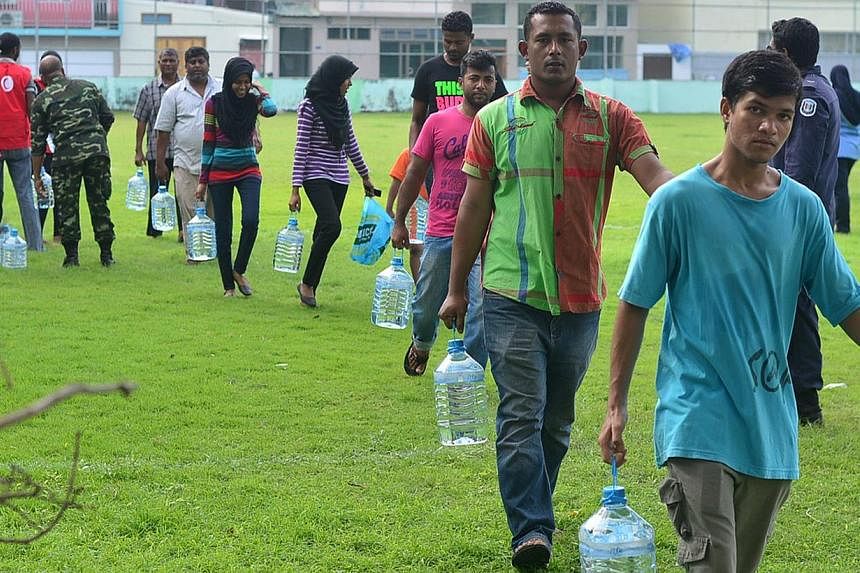MALE, Maldives (AFP) - India and Sri Lanka airlifted drinking water to the Maldives on Friday after a fire at a desalination plant led to severe shortages and triggered unrest on the streets of the honeymoon islands' capital.
Authorities declared a "disaster situation" after the fire on Thursday led to a drinking water crisis on the main island of Male, one of the world's most densely populated capitals.
Much of the capital was still without drinking water Friday and local media reported that angry residents fought and attacked shops that rationed mineral water, while hotels in Male said supplies were rapidly running out.
However, the crisis has not affected the atoll nation's upmarket tourist resorts, located on other islands, which by law have their own power generation and desalination plants.
India's air force flew bottled water onto the tiny island as authorities scrambled to repair the damage to the plant.
Neighbouring Sri Lanka also air lifted 100,000 bottles of water, officials said.
"We have mounted an enormous effort in our assistance to provide a... close partner of India in its hour of need," Indian foreign ministry spokesman Syed Akbaruddin told reporters in New Delhi.
"A total of five flights will carry a total of 200 tonnes of drinking water today. We will have another five flights tomorrow.
"We have also made arrangements for two ships to move to (the) Maldives."
Speaking to reporters in Colombo, a foreign ministry official said that the Sri Lankan government was "sending water as well as equipment needed to carry out urgent repairs to the water supply system".
A report in Minivan News, a private Maldivian website, said the damage to the water purification plant could take up to five days to repair.
"I think the situation is more serious than the government is admitting," a resident said, declining to be identified.
"We had water on tap for about an hour this morning, but that is hardly adequate."
Security forces were distributing water free of charge on the island, which measures just two sq km and is home to some 120,000 residents.
MIGRANT WORKERS REFUSED WATER
Activists said only those able to produce a Maldivian identity card were eligible for the free supplies, meaning thousands of migrant workers from Bangladesh, India, Nepal, Pakistan and Sri Lanka were being left out.
"Maldivians get water when they present ID cards. What about the thousands of unaccounted labourers in the Maldives?" asked political activist Shauna Aminath.
The private Haveeru newspaper reported incidents of expatriate workers being denied water at some distribution centres.
The newspaper quoted the Maldivian Democracy Network, a rights group, condemning those who discriminate between Maldivians and foreign labourers during the water crisis.
The Maldivian Red Crescent said it had deployed 24 staff and 60 emergency volunteers to help the government run water distribution points.
The low-lying island of Male has an efficient system of harvesting rain water, but the ground water cannot be used for drinking or washing, and residents rely heavily on treated sea water.
Many residents travelled to the nearby inhabited islands of Vilingili and Hulhumale, which were unaffected by the crisis, to stock up on water.
Around 330,000 people live in the Maldives, the smallest nation in South Asia, and over one million tourists are drawn to its turquoise seas and pristine white sandy beaches every year.
More than a third of the local population live in Male, putting huge pressure on resources such as drinking water and electricity supplies.

